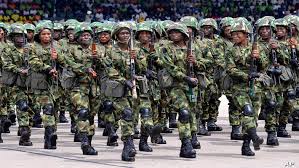In the often-overlooked corners of North-East Nigeria, a quiet but powerful offensive is shaking the foundations of terrorist strongholds. Between 15 and 22 July, Nigerian troops under Operation Hadin Kai launched a wave of carefully coordinated operations that have significantly disrupted the supply chains of Boko Haram and ISWAP.
This time, it wasn’t just a battle of bullets. It was a strategic takedown involving intelligence, ambushes, local collaboration — and some surprising discoveries.
From motorcycles packed with food, to smugglers carrying Starlink equipment and sacks of petrol disguised as ordinary goods, the week-long sweep revealed just how complex — and creative — terrorist logistics have become.
Not Just Guns and Ammo
At the centre of the operations was a clear objective: cut off the oxygen feeding insurgents — their drugs, weapons, communication tools, and informants.
On 19 July, troops arrested Mallam Aminu Idris along the Kano–Maiduguri highway. His offence? He was caught transporting Starlink satellite equipment without any official clearance. Now, satellite internet might not sound like a weapon, but in the hands of terrorists, it can be a tool for encrypted messaging, surveillance, or worse.
That same day, another suspect, Mr. Ali Abba, was stopped on his way to Damasak. Inside his vehicle: a stash of tramadol and diazepam — drugs often used by insurgents to numb pain, stay awake, and sometimes, fuel a false sense of invincibility before attacks.
But it wasn’t all high-tech or pharmaceuticals. In Adamawa’s Madagali LGA, soldiers intercepted supplies that looked more like items from a wedding party: motorcycles, soft drinks, cement and food. Yet in the battlefield of terror, even a bottle of Fanta can play a deadly role. These were logistics meant to feed and move insurgent cells across difficult terrain.
Targeted Ambushes and Surprise Raids
From Bama to Monguno, and Gwoza to Konduga, troops laid ambushes, conducted night raids, and engaged insurgents in fierce gun battles. According to Major General Markus Kangye, who briefed journalists in Abuja, several terrorists were neutralised, while others fled into hiding.
In Gwoza LGA, one terrorist was killed during a patrol around Amuda and Chinene. Just a few days later, along the Lambawa–Kalari road in Kaga, another insurgent was gunned down during a night ambush. Troops recovered weapons, bike parts, and other gear.
Perhaps most symbolic of the desperation setting in among terrorist ranks was what happened on 21 July: ten family members of insurgents surrendered in Bama. They had reportedly escaped from Gashua village, tired of living under fear, constant movement, and danger. Among those picked up during this period was also a 15-year-old suspected to be acting as a scout or informant for insurgents.
Smuggling in Disguise
Terror networks thrive on creativity. That creativity was exposed when troops discovered a syndicate smuggling fuel hidden in sacks along the Maiduguri–Mafa route. With fuel being a major resource for motorcycle-riding militants, this bust was no small win.
In another incident, a truck moving towards Gamboru was intercepted. Inside? Not weapons, but solar panels, inverters, batteries, and even refrigerators. These weren’t just household appliances — they were survival tools for fighters hiding in the bush.
Military authorities say these victories have delivered a major setback to Boko Haram and ISWAP. Cutting off logistics is like removing the spine of a movement — without it, fighters lose stamina, coordination, and mobility.
“These efforts have not only denied terrorists critical supplies but have also weakened their operational capabilities across the theatre,” said Major General Kangye.
While the Armed Forces continue their campaign, many Nigerians are cautiously hopeful. There’s still a long road ahead, but each intercepted truck, every busted drug shipment, and each informant uncovered brings the region a step closer to peace.
And in typical Nigerian fashion, someone might even joke: “So after all the wahala, terrorists too want cold drinks and Starlink? God dey.”
But behind the humour lies a hard truth — security is serious business. And for the people of the North-East, every victory matters.





